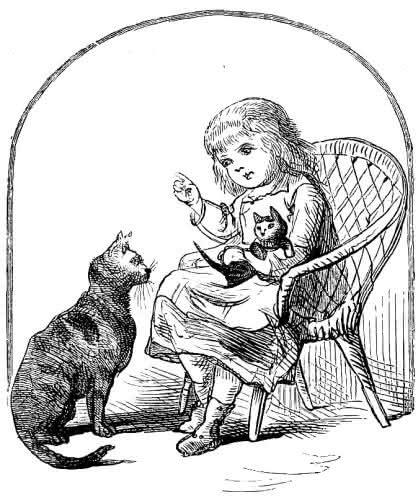Some children have difficulty transitioning from the only-child life to the older sibling life. Babies have a way of requiring some of the attention that the newly-minted older sibling may have become accustomed to receiving. Noses Out of Joint, a short poem in the January 27, 1880 edition of the nineteenth century children’s magazine, Harper’s Young People, took an interesting approach to the phenomenon. The poem begins with an illustration of a young girl with a kitten on her lap scolding an adult cat sitting on the ground looking at her expectantly. We learn in the poem that the girl had recently dealt with her parents’ attention being directed toward her new little brother. The girl determines that the adult cat was jealous of the attention that she was giving to the new kitten. Drawing upon her wealth of older sibling experience, the girl delivers a lecture in verse to the adult cat about the new situation. I reprint the poem below with its original accompanying illustration, just as it appeared in Harper’s Young People. Note that Harper’s did not list an author for the poem.
Reprinting “NOSES OUT OF JOINT”

You needn't cry and look so sad;
I love you, pussy dear, the same—
I truly do—as I loved you
Before this cunning kitty came;
But things are changed a little now,
You know, and 'cause he's very small,
I've got to 'tend the most to him.
Your nose is out of joint, that's all.
Don't you remember that cold day
They left me hours and hours in bed,
And when nurse came for me at last,
"your nose is out of joint," she said,
"A baby's come to like with us?"
Well, then, that's what's the matter now;
You might have known how it would be—
Oh dear, my head! Please don't me-ow,
Or I must send you out the room;
Nice little girls don't make a noise.